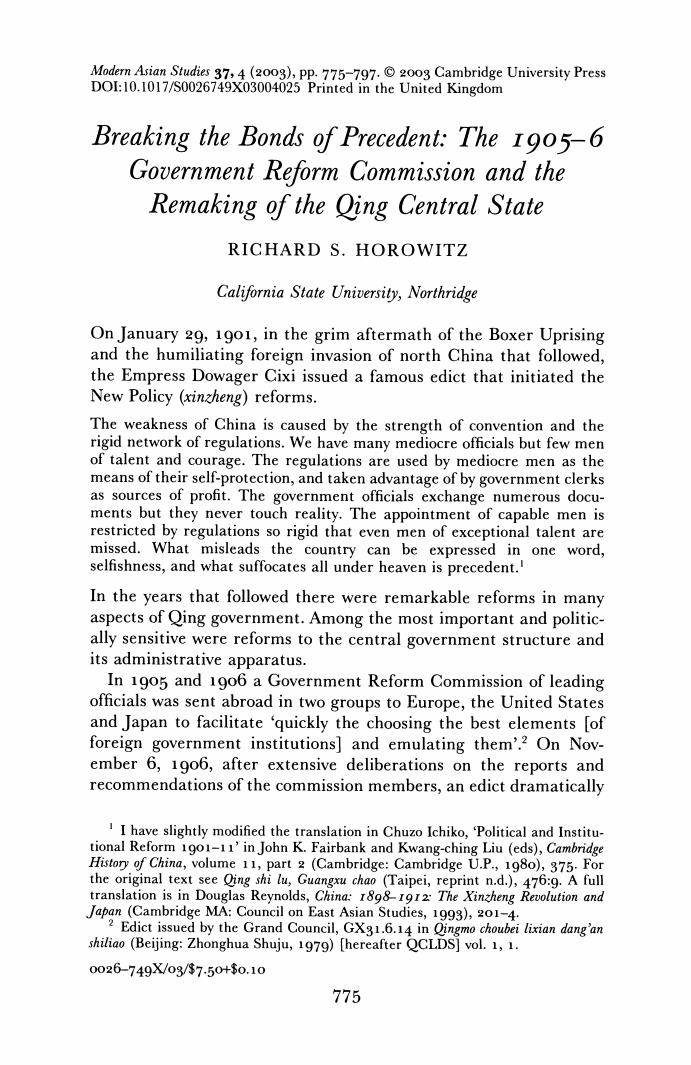正在加载图片...

Modern Asian Studies 37,4(200),Pp.775-797.003 Cambridge University Press DOI:10.1017/S0026749X03004025 Printed in the United Kingdom Breaking the Bonds of Precedent:The 1905-6 Government Reform Commission and the Remaking of the Qing Central State RICHARD S.HOROWITZ California State University,Northridge On January 29,1901,in the grim aftermath of the Boxer Uprising and the humiliating foreign invasion of north China that followed, the Empress Dowager Cixi issued a famous edict that initiated the New Policy (xinzheng)reforms. The weakness of China is caused by the strength of convention and the rigid network of regulations.We have many mediocre officials but few men of talent and courage.The regulations are used by mediocre men as the means of their self-protection,and taken advantage of by government clerks as sources of profit.The government officials exchange numerous docu- ments but they never touch reality.The appointment of capable men is restricted by regulations so rigid that even men of exceptional talent are missed.What misleads the country can be expressed in one word, selfishness,and what suffocates all under heaven is precedent. In the years that followed there were remarkable reforms in many aspects of Qing government.Among the most important and politic- ally sensitive were reforms to the central government structure and its administrative apparatus. In 1905 and 1906 a Government Reform Commission of leading officials was sent abroad in two groups to Europe,the United States and Japan to facilitate quickly the choosing the best elements [of foreign government institutions]and emulating them'.?On Nov- ember 6,1906,after extensive deliberations on the reports and recommendations of the commission members,an edict dramatically I have slightly modified the translation in Chuzo Ichiko,Political and Institu- tional Reform 1901-11'in John K.Fairbank and Kwang-ching Liu (eds),Cambridge History of China,volume 11,part 2 (Cambridge:Cambridge U.P.,1980),375.For the original text see Qing shi lu,Guangxu chao (Taipei,reprint n.d.),476:9.A full translation is in Douglas Reynolds,China:1898-1912:The Xinzheng Revolution and Japan (Cambridge MA:Council on East Asian Studies,1993),201-4. 2 Edict issued by the Grand Council,GX31.6.14 in Qingmo choubei lixian dang'an shiliao (Beijing:Zhonghua Shuju,1979)[hereafter QCLDS]vol.1,1. 0026-749X/03/7.50+$0.10 775Modern Asian Studies 37, 4 (2003), PP. 775-797. ? 2003 Cambridge University Press DOI:10.1017/S0026749X03004025 Printed in the United Kingdom Breaking the Bonds of Precedent: The 90o5-6 Government Reform Commission and the Remaking of the Qing Central State RICHARD S. HOROWITZ California State University, Northridge On January 29, 19ol01, in the grim aftermath of the Boxer Uprising and the humiliating foreign invasion of north China that followed, the Empress Dowager Cixi issued a famous edict that initiated the New Policy (xinzheng) reforms. The weakness of China is caused by the strength of convention and the rigid network of regulations. We have many mediocre officials but few men of talent and courage. The regulations are used by mediocre men as the means of their self-protection, and taken advantage of by government clerks as sources of profit. The government officials exchange numerous documents but they never touch reality. The appointment of capable men is restricted by regulations so rigid that even men of exceptional talent are missed. What misleads the country can be expressed in one word, selfishness, and what suffocates all under heaven is precedent.' In the years that followed there were remarkable reforms in many aspects of Qing government. Among the most important and politically sensitive were reforms to the central government structure and its administrative apparatus. In 1905 and 19o6 a Government Reform Commission of leading officials was sent abroad in two groups to Europe, the United States and Japan to facilitate 'quickly the choosing the best elements [of foreign government institutions] and emulating them'.2 On November 6, 1906, after extensive deliberations on the reports and recommendations of the commission members, an edict dramatically I have slightly modified the translation in Chuzo Ichiko, 'Political and Institutional Reform 1901-11' in John K. Fairbank and Kwang-ching Liu (eds), Cambridge History of China, volume 11, part 2 (Cambridge: Cambridge U.P., 1980), 375. For the original text see Qing shi lu, Guangxu chao (Taipei, reprint n.d.), 476:9. A full translation is in Douglas Reynolds, China: 1898-gi92: The Xinzheng Revolution and Japan (Cambridge MA: Council on East Asian Studies, 1993), 201-4- 2 Edict issued by the Grand Council, GX31.6.14 in Qingmo choubei lixian dang'an shiliao (Beijing: Zhonghua Shuju, 1979) [hereafter QCLDS] vol. 1, 1. 00oo26-749X/03/$7.50+$o.1o 775